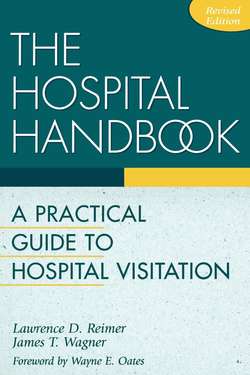Читать книгу Hospital Handbook - James T. Wagner - Страница 19
На сайте Литреса книга снята с продажи.
Consulting With the Physician
ОглавлениеHow will you know when you should consult with the physician about the patient's condition? Generally, you can rely on the family to share with you what has been reported by the physician. If it's comfortable for the family, be there when they meet with the physician, so you can hear what they have been told and be identified to the physician as a significant support person to the family. Contacts with the physician beyond these times should be for specific reasons, such as an agitated family member, organ donations, and preferences regarding extraordinary treatment interventions. You receive your authority in these areas from the family.
One of the areas in which clergy and patients often feel uncomfortable is getting a second opinion for a medical procedure. A patient or family may fear that this will offend their physician. However, second opinions, especially in serious interventions such as surgery, are becoming routine. Some industries which partially provide workers’ health insurance discount costs to the employee when a second opinion is sought. Health care providers should respect the right of individuals to this type of consultation. Usually it is wise to notify the original physician of this second consultation. Often this physician can facilitate referral to a competent colleague. At the very least, the pastor can alleviate any feelings of guilt or disloyalty the parishioner may have in seeking a second opinion. Such a consultation is a wise and increasingly routine procedure.
You now have the basic map for orientation to the hospital, making your call or visit, and dealing with some of the special issues of the patient's environment. With this information, it is up to you to develop your own unique style. Pastors who shared data for this chapter each prefer different times to visit. One finds non-visiting hours to his liking. Another sees the mid-afternoon as the time a patient is most free of other procedures. One pastor makes a point of visiting late in the evening the night before surgery, a time when a patient often feels most alone. That same pastor by the way also added, “I never bring the altar flowers.”
How you use this information is up to you. Now we move on the more specific situations.
